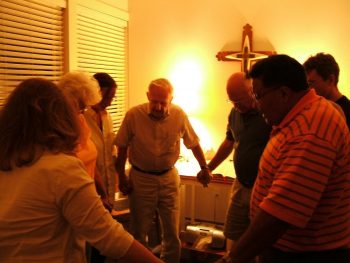
As you have been reading in this series of blog posts about prayer, we have learned the following:
- Our work begins with prayer, not with our own motivations.
- Pray for lost people by name.
- Pray for lost people daily.
Today we want to look at how your small group can gather to pray together for lost friends and lost people.
Often, if our group does pray together at group meetings for lost friends, the group often fails to make an actual list of lost people for whom the group is praying. This makes the group’s effort at praying for lost people a “hit or miss” activity. What if Stacy isn’t in the group meeting to bring up his lost friend Walter? What if Mike forgets that last time he asked the group to pray for James?
5 Reasons a Small Group Should Keep an Ongoing List
a. An ongoing list of lost people for the group to pray for will help the group avoid “one and done” prayers. A lost person’s name will appear on the list and the group can continue to pray for the salvation of Walter and James, even if the people who originally put their names on the list are not present.
b. A list can be duplicated. A simple list of 15 lost people that the small group is praying for can be copied and shared with the entire group.
c. A list turns the prayer for lost friends, family, and neighbors into a group concern, not just an individual member’s concern.
d. If the prayers of one saint are strong, the prayers of many saints will be even stronger.
e. The spiritual connection between group members increases dramatically when the each group member is spiritually burdened to pray not only for his or her lost friends, but also the lost friends of other group members.
Some Suggestions to Improve Group Prayer Time for the Lost
Set aside a specific Sunday of the month as THE Sunday the group will intercede for the salvation of lost people. (Yes, pray for the lost every Sunday, but a specific Sunday will stress the importance evangelistic intercession).
Pray evangelistic Scriptures. Some examples: John 3:16, Romans 10:9-10, 1 Timothy 1:15, Isaiah 6:8, Ephesians 2:8-9, Romans 6:23, Luke 8:11-15.
Ask for updates. Perhaps Stacy while having coffee with his friend Walter, Stacy was able to have a gospel conversation.
Invite lost friends into your small group. To many lost people, Christianity seems very unusual, even a little weird. What better way for a lost person to learn about Christ than in a community of His followers.
Adopt a People Group. According to the International Mission Board, there are almost 7,000 people groups worldwide who have yet to hear the gospel. Adopt one of these groups and pray for missionaries to be sent to the group; for the group to have the Bible translated into their own language; and for the Holy Spirit to work in advance to soften the hearts and minds of leaders who are in the people group, so that they can hear and comprehend the gospel message.
Bob Mayfield is the Personal Evangelism and Small Groups ministry partner for Oklahoma Baptists.


